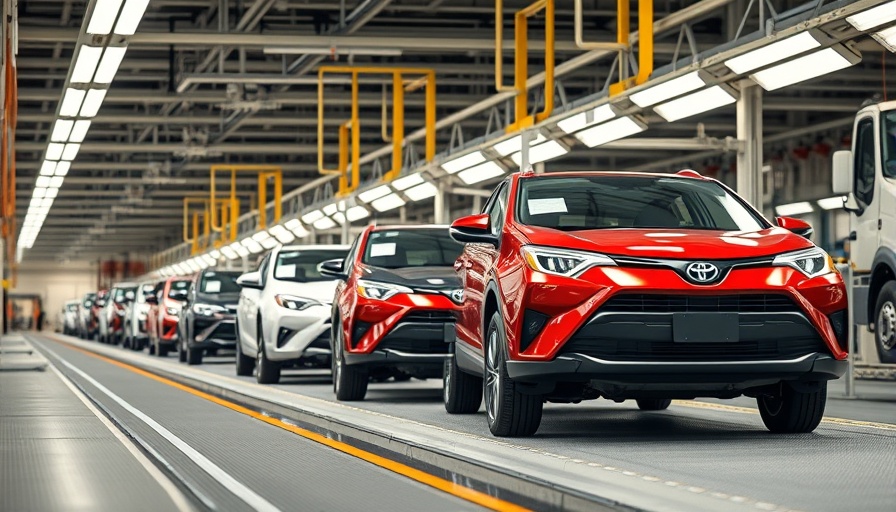
Understanding the Impact of Tariffs on Introduced Prices
The announcement of a 25% tariff on imported vehicles has reverberated across the automotive industry, impacting manufacturers and consumers alike. Toyota Motor Corp. has stated that it would not raise prices immediately in response to these tariffs, which could potentially result in car prices surging by thousands of dollars across the board. Already, the automotive sector has seen a dramatic rise in vehicle prices, escalating 31% from 2019 to 2024.
Reaction from the Automotive Giant
Toyota, which sold over 2.3 million vehicles in the United States last year, is closely monitoring developments regarding the tariffs, with the company’s North American headquarters located in Plano, Texas. Despite the challenges presented by these tariffs, which will eventually cover auto parts, Toyota is focusing on managing its fixed costs to maintain operations, as reported by several industry analysts. This reaction indicates the company's strategy to remain competitive while prices in the industry surge under these new regulations.
Current Sales Trends Amid Tariff Threats
Interestingly, Toyota's first-quarter sales surged by 7.7% compared to last year, with 231,335 vehicles sold in the quarter alone. This resilience in sales may reflect a strong consumer demand that Toyota aims to support without increasing prices for now. The overall automotive sector has had mixed performance amid ongoing supply chain issues and inflationary pressures stemming from the pandemic.
Wider Implications for the Automotive Sector
Industry analysts have forecasted that car prices could see a substantial uptick due to these tariffs, potentially pushing average prices to higher than most consumers can afford. With inflation already affecting economic choices, the introduction of these tariffs could compound the financial burden on American families, significantly altering the landscape of auto purchasing.
What Does This Mean for San Antonio?
For cities like San Antonio, where numerous Toyota facilities contribute significantly to local employment and economic stability, the tariffs pose both a risk and an opportunity. The potential inflation of vehicle prices may reduce consumer spending power, impacting local businesses that rely on a healthy automotive market. As the city navigates its business landscape, these shifts may affect everything from consumer behavior to employment rates at manufacturing plants.
Expert Opinions on Future Trends
Experts in the automotive sector have varying perspectives on the future implications of these tariffs. Some analysts believe that the increased costs will lead to a shift in consumer purchasing decisions, moving towards more domestic brands that may not be affected by tariffs as severely as international manufacturers. In contrast, others argue that high demand for vehicles will offset potential price increases, keeping sales buoyant in the short term.
Actions for Local Businesses
Local businesses should prepare for shifts in consumer interests and pricing strategy responding to these tariffs. Adapting to expected increases in vehicle costs could mean adjusting inventory strategies, enhancing customer engagement, and proactively addressing financial concerns of their customer base. Moreover, staying informed about federal policies and potential market changes will be crucial for local businesses navigating a rapidly evolving economic landscape.
Final Thoughts
The unfolding of these automotive tariffs evokes both concern and cautious optimism within San Antonio's business community. With Toyota navigating these challenges while maintaining stability in sales, the overall impact will depend on broader market dynamics and consumer response to increasing costs.
For those interested in staying updated on the shifting automotive landscape and its implications for local markets, following local business news through the San Antonio Business Journal is vital.
 Add Element
Add Element  Add Row
Add Row 



 Add Row
Add Row  Add
Add 


Write A Comment